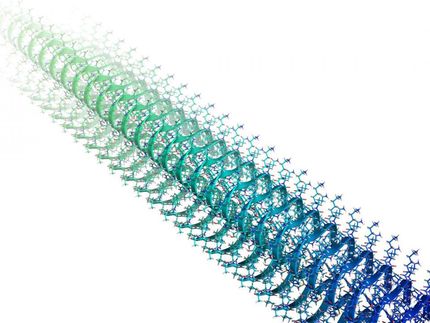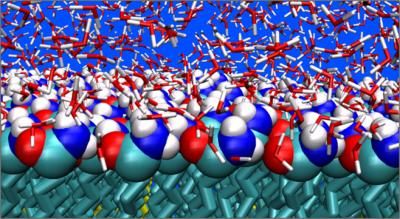A window that washes itself?
Tel Aviv University's new nano-material may revolutionize solar panels and batteries too
A coating on windows or solar panels that repels grime and dirt? Expanded battery storage capacities for the next electric car? New Tel Aviv University research details a breakthrough in assembling peptides at the nano-scale level that could make these futuristic visions come true in just a few years.
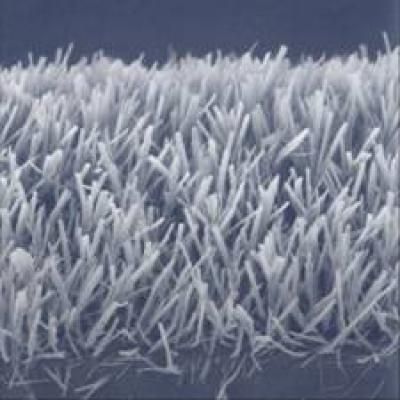
AFTAU
Operating in the range of 100 nanometers (roughly one-billionth of a meter) and even smaller, graduate student Lihi Adler-Abramovich and a team working under Prof. Ehud Gazit in TAU's Department of Molecular Microbiology and Biotechnology have found a novel way to control the atoms and molecules of peptides so that they "grow" to resemble small forests of grass. These "peptide forests" repel dust and water –– a perfect self-cleaning coating for windows or solar panels which, when dirty, become far less efficient.
"This is beautiful and protean research," says Adler-Abramovich, a Ph.D. candidate. "It began as an attempt to find a new cure for Alzheimer's disease. To our surprise, it also had implications for electric cars, solar energy and construction."
As cheap as the sweetener in your soda
A world leader in nanotechnology research, Prof. Gazit has been developing arrays of self-assembling peptides made from proteins for the past six years. His lab, in collaboration with a group led by Prof. Gil Rosenman of TAU's Faculty of Engineering, has been working on new applications for this basic science for the last two years.
Using a variety of peptides, which are as simple and inexpensive to produce as the artificial sweetener aspartame, the researchers create their "self-assembled nano-tubules" in a vacuum under high temperatures. These nano-tubules can withstand extreme heat and are resistant to water.
"We are not manufacturing the actual material but developing a basic-science technology that could lead to self-cleaning windows and more efficient energy storage devices in just a few years," says Adler-Abramovich. "As scientists, we focus on pure research. Thanks to Prof. Gazit's work on beta amyloid proteins, we were able to develop a technique that enables short peptides to 'self-assemble,' forming an entirely new kind of coating which is also a super-capacitor."
As a capacitor with unusually high energy density, the nano-tech material could give existing electric batteries a boost –– necessary to start an electric car, go up a hill, or pass other cars and trucks on the highway. One of the limitations of the electric car is thrust, and the team thinks their research could lead to a solution to this difficult problem.
"Our technology may lead to a storage material with a high density," says Adler-Abramovich. "This is important when you need to generate a lot of energy in a short period of time. It could also be incorporated into today's lithium batteries," she adds.
Windex a thing of the past?
Coated with the new material, the sealed outer windows of skyscrapers may never need to be washed again ― the TAU lab's material can repel rainwater, as well as the dust and dirt it carries. The efficiency of solar energy panels could be improved as well, as a rain shower would pull away any dust that might have accumulated on the panels. It means saving money on maintenance and cleaning, which is especially a problem in dusty deserts, where most solar farms are installed today.
The lab has already been approached to develop its coating technology commercially. And Prof. Gazit has a contract with drug mega-developer Merck to continue his work on short peptides for the treatment of Alzheimer's disease ― as he had originally foreseen.
Original publication: Nature Nanotechnology 2009
Topics
Organizations
Other news from the department science
These products might interest you
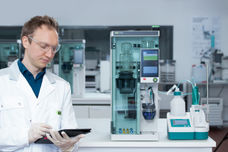
Kjel- / Dist Line by Büchi
Kjel- and Dist Line - steam distillation and Kjeldahl applications
Maximum accuracy and performance for your steam distillation and Kjeldahl applications
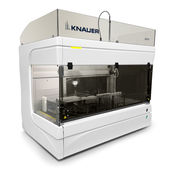
AZURA Purifier + LH 2.1 by KNAUER
Preparative Liquid Chromatography - New platform for more throughput
Save time and improve reproducibility during purification

Get the analytics and lab tech industry in your inbox
By submitting this form you agree that LUMITOS AG will send you the newsletter(s) selected above by email. Your data will not be passed on to third parties. Your data will be stored and processed in accordance with our data protection regulations. LUMITOS may contact you by email for the purpose of advertising or market and opinion surveys. You can revoke your consent at any time without giving reasons to LUMITOS AG, Ernst-Augustin-Str. 2, 12489 Berlin, Germany or by e-mail at revoke@lumitos.com with effect for the future. In addition, each email contains a link to unsubscribe from the corresponding newsletter.
